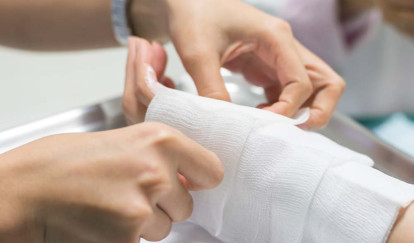
Share This Article
We've all been burned. Burn injuries may range from a small area of your skin to your entire body. If you sustain a burn injury, you may experience terrible agony. But a minor kitchen mishap that harms your finger completely differs from a severe burn that may leave you with permanent scarring or disability. The latter is what is referred to as a "catastrophic injury."
Some accidents that happen and cause minor or severe burn injuries are just accidents since no one is to blame. Other types of burn injuries may be due to vehicle accidents, unsafe premises, product defects, workplace accidents, or other incidents where someone is at fault. If that's the case, an injured victim may be eligible to recover damages through a workers' compensation claim or a personal injury suit in Virginia.
5 Common Types of Burn Injuries
Burns and fires are the fifth leading cause of accidental deaths in the U.S., with nearly half a million Americans seeking treatment for burn injuries each year. Burns are a type of injury that results in tissue damage. Excessive heat, overexposure to radiation or the sun, electrical contact, or exposure to chemicals may lead to this injury on one's skin.
Burns can be minor medical issues or life-threatening emergencies. Left untreated, a burn injury can lead to infection. Treatment mainly depends on the severity of the burn and its location.
Most burns happen accidentally. There are different types of burns that one may experience after coming into contact with thermal, chemical, electromagnetic, or electrical energy.
Thermal Burns
Thermal burns happen when heat sources raise the temperature of the skin and body tissues, leading to tissue cell death or black charring. Hot metals, hot liquids, flames, and steam can induce thermal burns when they come into contact with the skin.
Vehicle accidents, product malfunctions, arson, or even being served overheated coffee at your favorite restaurant can all lead to this type of burn, warranting the need for a burn injuries lawyer to pursue personal injury damages.
Electrical Burns
Electrical burns occur when one is exposed to either direct current (DC) or alternating current (AC). When one comes into contact with DC or AC electricity, this can lead to severe damage, especially to the lower layers of their skin. Since these types of burn injuries affect the lower skin layers, they may not be immediately visible.
In severe burn injury cases, electrical currents may cause extensive organ damage.
Electrical burns may happen when one comes in contact with a live wire, a piece of machinery, or an appliance. Burns caused by defective products may result in product liability claims due to manufacturing or design flaws.
Chemical Burns
These burns occur when strong solvents, alkalines, acids, or detergents come into contact with one's eyes or skin. Certain cleaning products, as well as beauty products, may cause chemical burns. Industrial chemicals such as dyes, inks, lubricants, adhesives, and coatings are the other culprits responsible for these types of burn injuries.
Friction Burns
These burns occur when skin is scraped off during contact with a hard and rough object, like the road or the floor. They occur as a result of heat and blunt trauma that's heightened by high speed. Also known as rub burns, friction burns are common in motorcycle or bicycle accidents.
Radiation Burns
Radiation burns happen due to prolonged exposure to high levels of radiation. Exposure to radiation may damage the skin, tissues, or other internal organs. Common sources of radiation that may result in burns include x-rays, radiation therapy, PET scans, and CT scans.
These burns aren't particularly likely. Nonetheless, they can become serious or even life-threatening when radiation levels rise. These types of burn injuries may take days or even weeks to show up and may be a sign of medical malpractice.
Burn Severity: First, Second, Third, and Fourth Degree Burns
Burns are classified into various types of burn degrees depending on how severely and deeply they penetrate the surface of the skin. Burn injuries that you sustain at home, in the workplace, or in any other premises may fall into four categories.
First-degree burns: These are mild burns that typically don't require medical treatment. Also known as superficial burns, these burns affect the outer layer of skin: the epidermis. The burn site may be dry, painful, and red. Victims of first-degree burns don't sustain any blisters. Long-term tissue damage is also rare.
Second-degree burns: These burns affect the top and lower layers of the skin — epidermis and dermis. You may experience redness, pain, swelling, and blistering after sustaining these burns. Deep burns can lead to scarring.
Third-degree burns: Full-thickness burns destroy the epidermis and dermis. They may also penetrate the skin and destroy subcutaneous tissue. The burn site may appear blackened, white, or charred. Full-thickness burns may also destroy nerves and cause numbness.
Fourth-degree burns: These burns happen when tendons, muscles, and bones are burned. The burn site may appear charred or white. Fourth-degree burns affect all layers of the skin and can be potentially life-threatening.
Suffered a Severe Burn Injury? Contact a Personal Injury Lawyer
Have you suffered a burn injury due to exposure to thermal, electrical, chemical, or electromagnetic energy? Do you believe that someone else is to blame for your traumatic injury and losses? If so, you should consider reaching out to an experienced burn injuries lawyer in Virginia.
Burns can be painful and costly to treat. Patients who sustain severe burn injuries may require extensive medical treatment and long-term care. Such burns may also carry the risk of permanent scarring and disability. If you or your loved one suffer burn injuries as a result of another party's careless or negligent actions, you may have legal grounds to pursue a personal injury claim or lawsuit.
Damages available in a burn injury claim may include medical bills, lost wages and benefits, pain and suffering, and disability. Enlisting the services of a competent Virginia burn injury attorney is essential if you want to recover personal injury damages.
At Commonwealth Law Group, our burn injury lawyers are ready to evaluate your case and discuss your legal options. Our legal team is here to guide you every step of the way. Schedule your free case review today.
If you have been injured at work or through the negligence of another individual or entity, contact us at (804) 999-9999 or or use the form below to connect with our legal team. We will fight to get you the justice you deserve.
